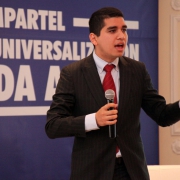Why immigrants make great ICT entrepreneurs
Zelalem Dagne had spent the past twenty-five years in the United States, but the thought of returning to Ethiopia continually intrigued him. Eventually, with some prodding from friends and co-workers, he returned. What he saw surprised him; the country was ripe for development and for new businesses, Dagne explains. Despite his initial urge to “do everything,” he focused on one problem in Ethiopia—delays in product transportation—and started a new business.
Dagne applied for and received a matching grant from USAID and Western Union’s African Diaspora Marketplace, allowing him to officially start Global Technology & Investment PLC. His company provides affordable GPS trackers to businesses that transport their goods in Ethiopia. The GPS trackers are attached to trucks, allowing business owners to monitor the efficiency of their truck drivers and the ensure prompt deliver of goods. Additionally, drivers can monitor traffic with the devices, allowing them to avoid traffic jams, check-in consistently with headquarters, and report back when goods are delivered. Dagne’s Fleet Management System is planned to be used in over 60,000 trucks.
In addition to strengthening business productivity in Ethiopia, Dagne’s company facilitates more national trade and makes Ethiopian businesses more attractive to foreign investors and international businesses. His company, then, contributes to Ethiopian development, allowing Dagne to give back to his home country through his business practices.
Dagne spoke ten days ago at a USAID-sponsored Microlinks seminar. Leaders of the African Diaspora Marketplace accompanied Dagne; representatives from USAID and Western Union also spoke on the program. The marketplace funded 14 projects last year, 5 of which are in the ICT sector. This year, in phase 2 of the marketplace program, there is a particular focus on ICT businesses.
Logically, immigrants and refugees would be ideal entrepreneurs in their own nations. They understand the business practices and technological developments present in the United States, and understand the needs of a particular country in the developing world. Their experience in both nations gives them unique vision. They see the differences between the places and what holes in one area can be filled by a solution from another country.
Additionally, ICT projects are particularly powerful in developing countries. The United States invests more than any other nation in research and development of ICTs. And as demonstrated by the rapid expansion of the mobile phone around the globe, “appropriate technologies” are quickly adopted by the developing world. Though the likelihood of the African Diaspora Marketplace funding the next mobile phone is highly unlikely, it is probable that the entrepreneurs funded by the marketplace will bring technologies already common in the United States, and integrate them into societies in their home countries.






































